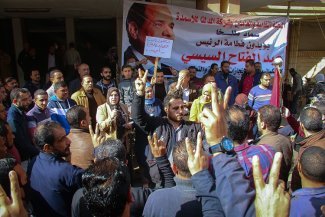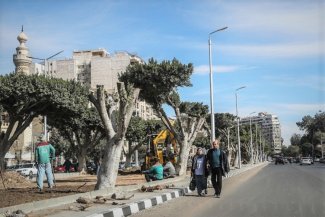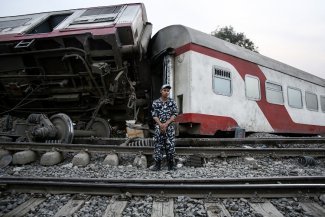
The Egyptian consulate in Istanbul, pictured here with its main gate fenced off, is closed to the public and only accepts requests for administrative procedures by email or Facebook.
The regime of Field Marshal Abdul Fattah al-Sisi in Egypt is without a doubt one of the most repressive in the world. Reports on human rights conditions in the country read like a veritable catalogue of horrors, detailing all manner of abuse and cruelty: forced disappearances, brutal torture, extrajudicial executions, prisons in deplorable conditions, even more draconian secret prisons, and the list goes on. While the government denies these abuses and refuses to acknowledge the existence of political prisoners, independent estimates put their number at around 60,000. The Egyptian government’s harsh stance on even the mildest form of criticism has driven thousands of dissidents into exile. But even when they are far away, few are truly safe from the regime’s reprisals.
According to a report by Human Rights Watch (HRW), the Egyptian government makes it difficult for dissidents to lead anything resembling a normal life in their host countries by denying them administrative services such as renewing passports and identity cards or issuing copies of birth certificates. “Denying exiled dissidents the renewal of some documents is one of the reprisals of the Egyptian regime against them. Another common reprisal is to harass their relatives living in Egypt,” explains Amr Magdy, author of the report.
“Passport renewal procedures must be approved by the intelligence services. If they know that someone has been critical of the regime or has participated in anti-government demonstrations, they refuse to provide them with a passport,” explains Mohamed Abbas, an Egyptian journalist based in Turkey.
“It’s not this hard to renew passports in all of Egypt’s diplomatic missions. The consulate in Istanbul is one of the worst because the regime knows that many exiles live here, in particular members of the Muslim Brotherhood,” says Abbas.
For all practical purposes, the Egyptian consulate in Istanbul is closed and only accepts requests for administrative procedures by email or Facebook. Regime critics who make such requests often receive a message urging them to travel to Egypt to obtain their desired documents. This is a frightening prospect for many, as dozens of Egyptians living abroad, including academics and journalists, have been arrested in recent years for crimes of opinion upon arrival at Cairo International Airport.
Relentless suppression of dissent
In 2013, a military coup put an end to Egypt’s democratic transition that began with the resignation of dictator Hosni Mubarak following a popular uprising that took place against the larger backdrop of the Arab Spring. Al-Sisi has since gone on to impose an authoritarian dictatorship even more brutal than that of Mubarak. While all dissent is ruthlessly repressed, state security services have particularly targeted the Islamist Muslim Brotherhood movement, winner of the elections during the country’s brief democratic interlude. According to estimates, over 25,000 people, including members of the Brotherhood and their families, have sought refuge in Turkey, a country governed by fellow Islamist Recep Tayyip Erdogan.
According to international human rights laws, countries cannot arbitrarily deprive their citizens of passports or any other identification documents. “The Egyptian regime violates even its own laws. The anti-terrorist law only allows for the confiscation of passports from people accused of terrorism, but it does not mention other documents like birth certificates,” says Amr Magdy of HRW. Egyptian authorities draw up arbitrary lists of suspected terrorists, which often include peaceful opponents. Most of the regime’s critics living outside of the country who are victims of reprisals are not even on these lists.
“Egypt is not the only country to adopt these kind of measures. There are a few others, like Saudi Arabia. But only the most repressive ones do it,” says Magdy.
“While some exiles have received Turkish citizenship, they are few and far between. Most of us experience a lot of problems because of the documents we lack,” explains Mohamed Emad, a prominent former MP for the Brotherhood-linked FJP party. The HRW report provides numerous examples of the challenges faced by exiles without documents. For example, two parents of children born in Turkey report that their children have not been able to receive the vaccinations required in Turkey as they have been unable to register their births. They are also unable to access public health care and fear that their children will not be able to attend school. In other cases, the lack of documents has prevented exiles from getting married or opening a bank account.
In the worst-case scenarios, exiles without valid identity documents are deported to Egypt where they face serious risk of detention, unfair trials and torture. Despite these dangers, several countries have deported Egyptian nationals, including Sudan, Saudi Arabia and Malaysia. The threat of deportation to Egypt leaves many exiles in a state of constant anxiety. One such exile, Ibrahim Abouali, an activist living in Malaysia who faces potential deportation following the expiration of his passport, made a video that went viral several months ago. “Here in Turkey we are not afraid of that. It’s a red line for the Turkish government. They will not deport anyone whose human rights are at risk,” says Emad.
However, Ankara and Cairo have been undergoing a process of reconciliation over the past two years that has impacted the lives of Turkey’s Egyptian exile community, particularly its most politically active members. “The Turkish government has asked that criticism of the Egyptian regime be toned down and that certain red lines not be crossed when it comes to personal attacks on al-Sisi. Some journalists have accepted this, while others have opted to move to London,” says Abbas. For years, Istanbul was an important centre for Egyptian opposition media. The city was host to over a dozen media outlets, most of them pro-Muslim Brotherhood, including the satellite TV channels Al Sharq and Mekameleen. Last year, however, Mekameleen decided to close its offices in Turkey. In a statement, it attributed its decision to “circumstances that everyone knows about”.
Perhaps one of the cruellest forms of pressure and revenge exacted upon exiles is the punishment that their relatives in Egypt endure, from raids on their homes to forced disappearances, long detentions without charges, bans from travelling abroad, dismissal from their jobs, etc.
"They treat our relatives like hostages. My son has tried to leave Egypt three times but they won’t let him. I know some cases of wives of exiles who have not been able to see their husbands for ten years. At the airport, the authorities confiscate their passports and even pressure them to divorce,” says Emad. One of the best-known cases, reported by some 20 organisations, is that of Amr Abu Khalil, brother of Al Sharq television journalist Haitham Abu Khalil, who was critical of al-Sisi and his family in his reports. Amr Abu Khalil died in prison after spending eleven months in detention without trial.
Currently faced with a severe economic crisis, the Egyptian government recently launched a national dialogue with the opposition and released hundreds of political prisoners as a sign of goodwill. However, few see these gestures as a serious attempt at reconciliation. “It’s a new move to improve its image with no changes on the ground. It’s true that from April 2022 until now they have freed between 1,000 and 1,200 people, but they have arrested thousands of others, including some of those that had been freed,” says Magdy. “This process is cosmetic because the government has vetoed the real opposition. Several groups, like ours, have been excluded, but they have even arrested members of some of the parties that were going to participate. How can anyone take it seriously?” asks former MP Emad from his office on the outskirts of Istanbul.












